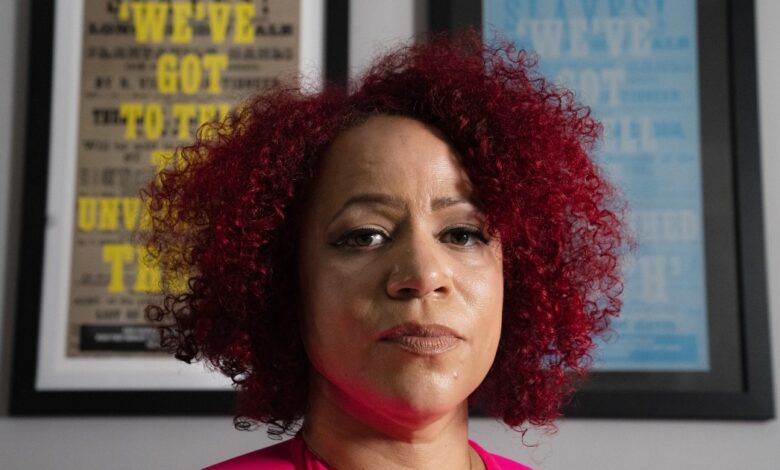How Nikole Hannah-Jones Flipped the Script on Chapel Hill

The drink had been suggested in a phone call from Susan King, dean of the journalism school at the University of North Carolina at Chapel Hill, where Hannah-Jones, moments earlier, had been granted tenure by a split vote of the Board of Trustees.
This moment, on June 30, marked the culmination of a monthslong journey that had, once again, placed Hannah-Jones, a Pulitzer Prize-winning journalist, at the very center of the nation’s polarizing reckoning over race. Hannah-Jones, who is Black, had agreed in February to take an untenured position as Chapel Hill’s Knight chair in race and investigative journalism. This diverted from precedent at Chapel Hill, where all three previous Knight chairs, all of them white, had been tenured.
It was not surprising to Hannah-Jones, who spoke to The Chronicle on Thursday, that she had been treated differently. As a Black woman from a working-class family, inequity had been a stark fact of life, as real as the bourbon in her hand. Nor was the attendant backlash to Hannah-Jones’s hiring unexpected. “The 1619 Project,” a multimedia series she developed for The New York Times Magazine, is an unyielding and controversial examination of the legacy of slavery in America. It has won praise as an overdue historical corrective, but it has also been criticized by some historians for inaccuracies and bashed by political conservatives as an ideological hit job.
Exhausted by the attacks on her work, Hannah-Jones had agreed to the untenured position in part to avoid a fight with her alma mater, where she had earned a master’s degree in 2003. But something changed in May that made a fight unavoidable. NC Policy Watch, a political website, reported on Hannah-Jones’s case, suggesting that the board had not voted on her tenure application because of political opposition to her work.
Members of the Chapel Hill board are appointed by the Republican-controlled legislature and the system’s Board of Governors, whose members are also appointed by the legislature.
By the time the board voted to hire her with tenure, under enormous public pressure, it was too little, too late, Hannah-Jones concluded. She had said she would not start work on July 1 without tenure, and the board had waited until the last possible moment to act.

Rachel Jessen for The Chronicle
At the hotel bar, Hannah-Jones snapped a photo of the glass of whiskey in her hand, partially capturing the image of a tattoo along her inner right wrist. It reads, “Waterloo,” an homage to her hometown in Iowa. Hannah-Jones got the tattoo after she was awarded a MacArthur fellowship, in 2017. After all of her accolades, it was meant to remind the journalist of her roots as a girl from a blue-collar town in a flyover state, the daughter of a bus driver and a probation officer.
When she posted the photo to Twitter, more than 26,000 people hit the “like” button. The photo signaled a vindication; Hannah-Jones had gotten her due. But, at that moment, she knew something others did not: She wasn’t coming to Chapel Hill after all.
During the news conference, Richard Y. Stevens, the chairman, had suggested the board did not act because King, the dean, had decided to take a different route. Kevin M. Guskiewicz, the chancellor, did nothing to correct the narrative, which Hannah-Jones found misleading. King was the only person in the process whom Hannah-Jones actually trusted. Whatever political machinations might have been happening behind the scenes, she thought, King wasn’t part of them. Now, the board’s chairman seemed to be throwing the dean under the bus — and the chancellor was nodding along.
On a Zoom call later with Guskiewicz, Hannah-Jones pressed the issue. She insisted King join the call, thinking, “You cannot blame her for a thing if she’s in the room and she knows it’s not true.”
“I asked him at that meeting, ‘Why would you allow Stevens, uncontradicted, to say that Dean King was the one who jumped the gun and offered me the contract, if you knew it wasn’t true?’ He would not answer that question.”
“To me,” Hannah-Jones said, “it epitomized the lack of courage and the unwillingness to be truthful and transparent.”
Guskiewicz has a different perspective, which he shared with The Chronicle in an interview on Friday. The chancellor bristled at the criticism that he had failed to exhibit courage in this crisis.
“When it comes to forthright and courageous, let me explain a bit here,” he said. “I’ve been on record stating that I wanted Nikole Hannah-Jones at Carolina, up to and through the vote on her tenure. I’ve talked a lot about shared governance throughout this process, because it’s really important. In a shared-governance model, bullying people into a position doesn’t work; it’s about diplomacy and ensuring our tenure process is followed. I poured myself into this, and there were numerous conversations between me, members of the board, and the provost to work on a path forward that led to the vote.”
“Whether people like it or not,” he added, “a lot of that’s happening behind the scenes to make certain that we get to the right place.”
Offering Hannah-Jones a “variable-track option,” as Chapel Hill did in February, meant that she would be eligible for tenure at a future date. Time was of the essence to strike a deal, the chancellor said, because the dean had told the provost that Hannah-Jones “had two other job opportunities in January and that we were in jeopardy of losing her.”
Asked about this, Hannah-Jones said via text that she had, of course, been contacted at other times by other journalism programs potentially interested in hiring her. But she had no other offers, and she wanted to come to Chapel Hill. “I was not looking for a job,” she texted. “I was interested in THIS JOB.”
The board’s university-affairs committee had been slated to take up Hannah-Jones’s case in November, and then again in January. Yet it did not act. Charles G. Duckett, the committee’s chairman, has said he had questions about her teaching experience, among other things, that went unanswered. But it is “not logical,” Hannah-Jones said, to argue that these questions warranted scrapping a tenure vote. “If their only worry was losing me, why would they not say simply: ‘There were a few questions, we’re going to answer them and then you’ll get your vote in March.’”
The Hannah-Jones case has spawned deeper conversations about the limits of campus chancellors’ powers in North Carolina’s politicized governance system. This week, The Daily Tar Heel, Chapel Hill’s student newspaper, published an opinion column from Mimi V. Chapman, chair of the faculty, who argued that the threat of legislative retribution has effectively paralyzed campus leaders. Republicans control all of the levers of power over the university system, Chapman wrote, and there is a legitimate threat that party leaders will starve a campus that “gives voice to its values.”
“This hyperpartisan reality,” Chapman wrote, “means that our administrative leaders, namely the chancellor and provost, are in a position where they cannot transparently lead or autonomously make decisions for our campus.”
Only a broad coalition, demanding systematic governance reform in North Carolina, will empower chancellors to lead, Chapman argued.
Public higher education is under increasing political scrutiny, and academic leaders in majority-Republican states are frequently torn between the progressive mores of their campuses and the conservative positions of their boards. But Hannah-Jones is dubious of the argument that political considerations should confine chancellors to silence when core values are under threat. In this case, academic freedom and faculty autonomy over the tenure process were both imperiled, she said.
“I clearly understand the political position that he’s in,” Hannah-Jones said of the chancellor. “These are basically his bosses; I get that. But at some point, you just have to stand up for what is right. That is what leadership is.”
Hannah-Jones was particularly dismayed to learn that Walter E. Hussman Jr., an Arkansas newspaper publisher for whom the journalism school is named, had lobbied behind the scenes in opposition to her hiring. Emails, which were revealed in May by The Assembly, showed that Hussman had criticized her work, not only to the dean, but also to the chancellor and the vice chancellor for university development. Hussman has also acknowledged contacting at least one board member.
The board might not have voted at all on Hannah-Jones’s tenure case if not for the demands of Lamar G. Richards, Chapel Hill’s student body president, who is a voting trustee by virtue of his office. Richards, who is Black, formally proposed a special meeting of the board to take up the case, which triggered last week’s vote.
Any intel Hannah-Jones was getting before the vote, she said, came from a Democratic politician, who was keeping tabs on the backroom lobbying around her case. Hannah-Jones, who declined to identify the person, said she received a call from the politician just before it was announced that a vote would finally be held. The person told her that, if the vote were to be held that day, she would get tenure. But “there was a lot of pressure being applied,” and the “slim margin” could tip another way.
As the board meeting began, Hannah-Jones was in her hotel bed, working on a “1619” book that is to be released in the fall. She was watching via a livestream when a group of protesters entered the boardroom, only to be physically removed by the police when they refused to leave after the trustees voted to enter a closed executive session.
It is standard for public-college governing boards to discuss personnel matters, such as tenure, in closed sessions. But they often do so by entering a private room. Chapel Hill’s approach created a situation that seemed all but guaranteed to create a spectacle, which it did, as young, mostly Black demonstrators were bounced from the room, thrust into a narrow hallway, screaming.
As Hannah-Jones watched the situation unfold, “Tears literally sprang to my eyes. I was horrified and appalled.”
The chancellor and trustees, seated at a long table, remained silent as the police shoved the students. It fell largely to a police officer, who is Black, to explain to the students that the board would not vote — could not vote — unless the students left the room.
“It was shameful and it was enraging,” Hannah-Jones said. “It just affirmed for me why I did not want to come anymore.”
“I was just really appalled by the lack of leadership there,” she said. “Any one person sitting behind those tables could have just spoken up and defused that situation by explaining what was happening.”
The board remained in executive session for nearly three hours. Once the vote had been cast in Hannah-Jones’s favor, Robert A. Blouin, the provost, directed King, the dean, to call Hannah-Jones to tell her the outcome, King told The Chronicle. Giving Hannah-Jones a heads-up before the formal, public vote was seen as a courtesy.
She and the dean “both felt vindicated,” Hannah-Jones said. “Not only did we force them to vote, but they were forced to acknowledge that I was worthy of tenure.”
On the call, King asked if she could tell the school’s faculty that the journalist would come to Chapel Hill. “I told her, not yet,” Hannah-Jones said. “I need some time to process everything that’s happened.”
By that point, however, Hannah-Jones had effectively made her decision. She had first pressed the board, through her lawyers, to grant her a tenured appointment as a full professor no later than June 4, and she fully expected to come to Chapel Hill if that had happened, she said. But the board’s continued stalling, only voting at the final moment, ate at her. The chancellor’s evasiveness frustrated her. The use of force against her supporters at the meeting — it was all too much.
Early in the crisis, Hannah-Jones had had a conversation with Wayne A.I. Frederick, president of Howard University, a historically Black institution in Washington, D.C. The fruits of that discussion were made public on Tuesday, when Hannah-Jones appeared on CBS This Morning, delivering to the co-host Gayle King a bombshell scoop: Rather than head to Chapel Hill, Hannah-Jones would join the faculty at Howard in a tenured position as the inaugural Knight chair in race and journalism. There, she planned to found the Center for Journalism and Democracy.
Backed by $20 million in donations, Howard announced that, in addition to Hannah-Jones, Ta-Nehisi Coates, the acclaimed journalist and author of Between the World and Me, would join its faculty ranks.
In basketball parlance, it was easy to conclude that Hannah-Jones had just “dunked on UNC.” But she had conflicting emotions, she said. People, particularly Black students, had been hurt by what had happened. What seemed to Hannah-Jones an opportunity to give back to her alma mater had been spoiled, as she saw it, by ugly backroom politics. But it was too late to change all of that.
“I did decide at some point that these people were not going to have a say over my life,” she said. “They just weren’t.”
Finishing her bourbon that evening in Chicago, Hannah-Jones had something that the trustees couldn’t grant and, more important, something they couldn’t take away: her power.






